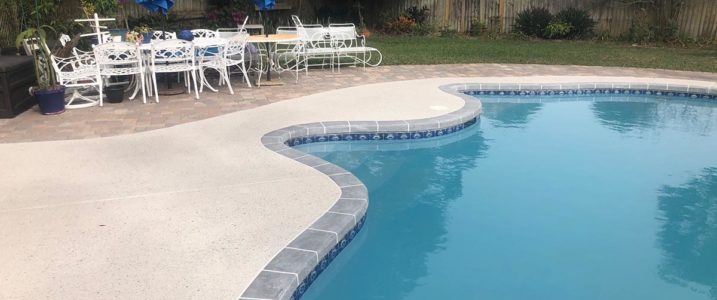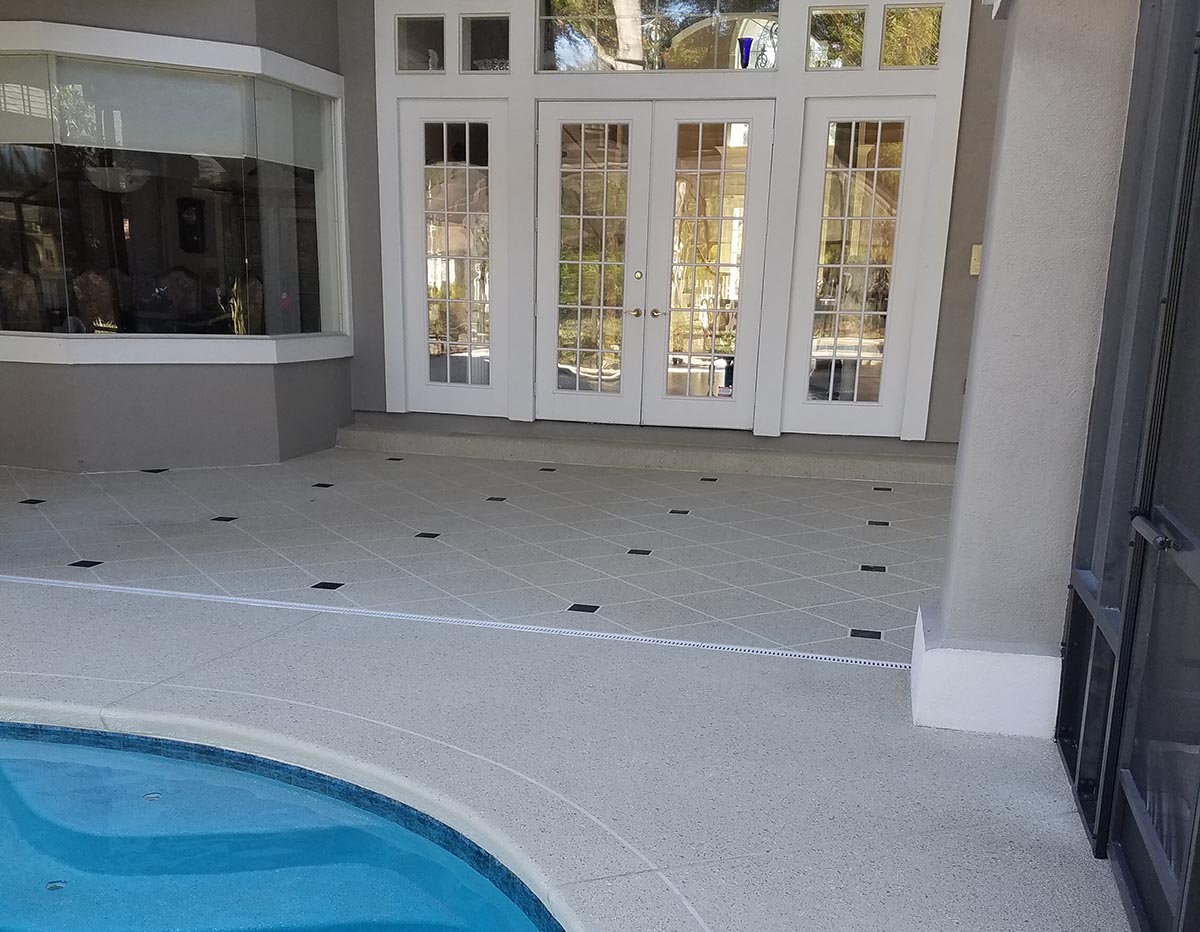
When your concrete surfaces are looking tired, cracked, or faded, you don’t always need a full tear-out and replacement. With the right approach, you can resurface, bringing new life, strength, and longevity to your pool decks, patios, lanais, or commercial slabs. In Jacksonville’s climate, that’s often the smarter (and more budget-friendly) solution. In this article, we’ll explore the what, why, and how of Jacksonville concrete resurfacing, what you should expect, and how to choose a contractor you can trust.

What Is Concrete Resurfacing, and What it’s Not
At its core, concrete resurfacing is applying a new layer or coating over existing structurally sound concrete to restore its look and performance without full-scale demolition. It addresses issues like minor cracks, surface wear, spalling, discoloration, or dated aesthetics.
However, it’s important to know what resurfacing isn’t — and what Coastal Coating & Resurfacing explicitly does not do:
-
We do not apply decorative stampings, acid stains, coloring, or spray-off textures.
-
Our focus is on restoring function and enhancing durability.
This means their resurfacing works best when your concrete is fundamentally sound and you want to restore and protect it, not completely restyle it.
Why Choose Resurfacing Over Replacement in Jacksonville
1. Cost Efficiency
Replacing concrete entirely can be expensive. Resurfacing allows you to get a “new” surface at a fraction of the cost.
2. Time and Disruption
A full replacement is labor-intensive and disruptive. Resurfacing can often be completed within 2 to 4 days (depending on scale and prep work).
3. Performance Upgrades
With the right system, resurfaced concrete can perform even better than the original surface. In Florida, you need resistance to UV, mold, heat, and pool chemicals.
4. Lower Maintenance
A well-applied, non-porous resurfacing layer keeps stains, mold, mildew, and oil off your concrete. You can keep it clean using a garden hose, dish soap, and periodic pressure washing.
5. Warranty and Assurance
Reputable contractors back their work. Coastal Coatings provides a limited warranty and a maintenance tips.
The Coastal Coating & Resurfacing Approach
Since Coastal Coating & Resurfacing is the basis for this article, here’s how they do things and how that aligns with best practices in Jacksonville concrete resurfacing:
Our System: CTI Concrete Acrylic Resurfacing
We use a modified 100% acrylic resin spray coat (the CTI system) applied over structurally sound concrete. This approach offers:
-
Twice the strength of standard concrete coatings
-
A stable, long-lasting protective surface
-
Resistance to Florida’s rigors: UV light, extreme heat, moisture, chemical exposure
Key Benefits of the Surface
The finished surface delivers:
-
Non-skid texture, critical for pool decks and wet areas
-
Heat resistance, so it doesn’t become unbearably hot underfoot
-
Mold, mildew & oil resistance, since it’s non-porous
-
Fade resistance, holding up against harsh sun
-
Low maintenance, easy cleaning and long intervals between major upkeep
Project Details to Know
-
Minimum job cost: $1,800 (final price depends on square footage and prep needs)
-
Prep work: Crack repair, paint removal, addressing drains or channels
-
Timeline: 2–4 days typical
-
Use readiness: Walk on after 24 hours; wait 7 days before placing furniture or heavy loads
-
Warranty & support: 5 years, plus a maintenance guide
Service Area
We serve Jacksonville, Jacksonville Beach, Neptune Beach, Atlantic Beach, Ponte Vedra, and surrounding areas.
What to Expect During a Resurfacing Job
Here’s a walk-through of how a project typically goes:
-
Inspection & Assessment
We inspect for structural issues, checks for serious underpinning problems, and determines if resurfacing is viable. -
Surface Preparation
-
Clean the slab thoroughly (e.g. pressure washing)
-
Remove paint, coatings, or old sealers
-
Repair cracks, spalls, chips
-
Address drainage or control joints as needed
-
-
Application
The CTI acrylic resurfacing layer is sprayed or troweled (depending on the system) over the prepared surface. -
Curing & Protection
The new surface cures, with care not to stress it too early. After about 24 hours it’s walkable; after 7 days it can take furniture and traffic. -
Final Inspection & Handoff
The contractor reviews the finish, provides care instructions, and ensures you’re satisfied.

Why Local Jacksonville Conditions Matter
Any contractor doing resurfacing in Jacksonville should know:
-
Sun & heat stress — the coating must resist expansion, UV breakdown, and thermal cycling
-
Humidity & moisture — water intrusion or dampness must be addressed in prep
-
Pool chemicals — chlorine or salt spray may be present in your pool area
-
Drainage & slope — Florida’s storms demand proper water shedding
Because Coastal Coating tailors our process to Florida’s climate (especially in Northeast Florida), their system tends to outperform generic coatings designed for milder regions.
How to Choose a Concrete Resurfacing Contractor
Here are some red flags and tips when vetting contractors:
-
Ask for references or portfolios of completed Jacksonville-area resurfacing jobs
-
Verify warranty and written agreements, plus what the warranty covers
-
Inspect materials, and ask whether they use 100% acrylic resin systems, not cheaper mixes
-
Check licensing and insurance especially in Florida, where storms, liability, and environmental regulation matter
-
Beware high-pressure sales or “decorative extras” if your goal is durability, not ornamentation
-
Ask about maintenance expectations over the life of the surface
A trustworthy resurfacing contractor should clearly explain what they don’t do (e.g. stamping, coloring) and focus on getting the performance right.

Maintenance Tips After Resurfacing
Once your surface is renewed, here’s how to help it last:
-
Rinse with garden hose and mild dish detergent as needed
-
Annually pressure wash (low setting) to remove buildup
-
Avoid dragging sharp objects or heavy metal items across it
-
Use protective pads under furniture legs during the first weeks
-
Address small chips or damage quickly — don’t let them worsen
Final Thoughts
If you’re dealing with cracked, faded, or worn concrete in Jacksonville, whether pool deck, patio, lanai, or commercial slab — concrete resurfacing offers a smart, cost-effective path. The right contractor using a high-quality system (like 100% acrylic overlays) can deliver a strong, low-maintenance surface ready for Florida’s sun, rain, and humidity.
- Concrete Coating in Jacksonville, FL: What Homeowners Need to Know Before Resurfacing a Pool Deck, Patio, or Garage Floors
- Jacksonville Custom Pool Waterfalls & Waterslides: Outdoor Living with Coastal Coating
- Freshen Up Your Garage with Professional Garage Floor Resurfacing in Jacksonville, FL and the Beaches
Contact us today with your questions or to discuss your new or existing project! We look forward to hearing from you!
Phone: 904.223.6961
Email: mark.coastalcoating@gmail.com

